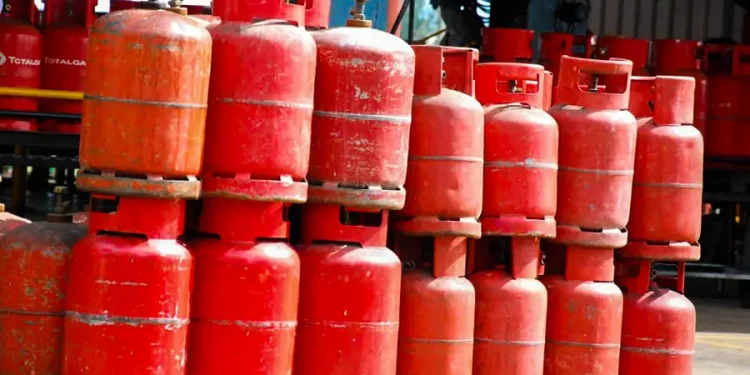The federal government has just directed the Nigerian National Petroleum Company Ltd. (NNPCL) and Liquefied Petroleum Gas (LPG) producers to stop exporting LPG on November 2, 2024. The government cited the persistent increase in cooking gas prices nationwide as the reason for the measure.
It said that under this short-term arrangement, the NNPC and LPG producers would stop exporting gas produced in-country or import equivalent volumes of LPG exported at “cost-reflective prices.”
Also, the government directed the Nigerian Midstream and Downstream Petroleum Regulatory Authority (NMDPRA) to engage stakeholders in evolving a domestic cooking pricing framework within 90 days.
The new approach would end the government’s current practice of indexing against external markets, such as the Americas and Far East Asia. In contrast, the commodity is produced in-country, and Nigerians are made to pay a higher price for an essential commodity the country is naturally endowed with.
Apparently aware that the measure may not entirely produce the desired results or make any meaningful impact because of the volatile gas market, the government offered a supposedly long-term solution: Within 12 months, facilities would be developed to blend, store, and deliver LPG and end exports until the market achieves sufficiency and price stability.
RELATED: Again, Federal Gov’t Stops Cooking Gas Export To Crash Price
If only things could work perfectly like this in Nigeria. One symptom that Nigerian leaders are yet to purge themselves of is making policy pronouncements that have nothing to stand on.
The government’s thinking or belief that facilities for the blending, storage, and delivery of cooking gas could be completed in 12 months in Nigeria amounts to self-deception.
From this newspaper’s standpoint and its understanding of how things work in Nigeria, especially in the public sector, the ban on cooking gas export will only address the symptom, not the disease.
The root causes of the commodity’s staggering N1,500 per kilogramme price, which makes a 12-5 kilogramme cylinder sell above N18000, demand comprehensive solutions.
We believe the recent surge in cooking gas prices is not just about its price. Its scarcity, which has wreaked havoc on Nigerian households and exacerbated economic hardship, transcends scarcity, stemming from entrenched economic and logistical flaws.
Added to these are the drastic changes in key economic fundamentals caused by the removal of fuel subsidies and the federal government’s hike in electricity tariffs.
These twin economic policies increased fares, haulage, and other distribution costs. The cost of producing various commodities, including cooking gas, also increased. The cost of doing business in Nigeria has really gone up, and gas producers operate in the same economy.
To us as a newspaper, the government cannot keep the price of gas down when all others are up. Also, the spiralling price of cooking gas is not a result of the commodity’s export but a function of the distortions in the economy.
We experienced the same trend in kerosene pricing until it got out of the reach of the poor, who desperately needed it for domestic chores.
Has any government official ever wondered why kerosene, a by-product of petrol, ceased to be sold in filling stations and went out of circulation at a time when the government created strong awareness among citizens to use the product to protect the environment?
In the present case, the product’s price is due to logistics and distribution challenges. These challenges hinder efficient delivery to consumers. Inadequate infrastructure and inefficient transportation networks also contribute to the disruptions, which empower middlemen to manipulate prices.
Similarly, there are market manipulations and hoarding. Unscrupulous gas traders exploit the sector’s lapses and use the same as an excuse to inflate prices.
Also, regulatory gaps enable exploitative pricing. The absence of robust price control mechanism allows gas marketers to dictate prices. The export ban will be ineffective if the identified gaps are not meticulously addressed. The government and the end-users will lose in the medium to long term.
Nigeria risks replicating the kerosene pricing debacle, which pushed low-income users off the consumption matrix. Deforestation accelerates as households revert to good old reliable firewood.
In our reasoning, the way forward is to enforce price controls, implement robust mechanisms preventing exploitative pricing, combat hoarding and take proactive actions against market manipulators.
There should equally be distribution efficiency and public price disclosure as obtained in the petrol sector.
Resolving the current pricing crisis is crucial for the well-being of most Nigerians who have embraced cooking gas in their homes. Effective policy interventions can mitigate the hardship the price hike has inflicted on the people.
Overall, we are compelled to posit that the energy crisis, which includes the scarcity and eventual high cost of gas, requires a holistic policy intervention. The ongoing piecemeal and local anaesthetic approach is unhelpful as it only plays into the hands of those used to benefitting from Nigerians’ sufferings—and there are many of them in both the public and private sectors. Dislodging them is the crux of the matter.



